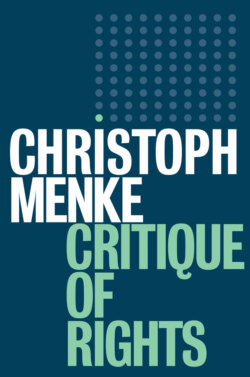Critique of Rights

Реклама. ООО «ЛитРес», ИНН: 7719571260.
Оглавление
Christoph Menke. Critique of Rights
CONTENTS
Figures
Guide
Pages
Critique of Rights
MARX’S PUZZLE
Notes
Part I History: The Legalization of the Natural
Notes
1 A PHILOSOPHICAL HISTORY OF RIGHT’S FORM
The Reversal of Primacy
A New Form of Government: “Modern Roman Law”
Excursus: The Politics and History of Civil Law (Weinrib)
From Athens to London
Notes
2 INTEREST IN SELF-PRESERVATION
From Share to Power. 1 Athens
2 Rome
3 London
Excursus: Ockham’s Defense of Poverty (Villey)
Right to the Extra-Juridical
Excursus: Rights and Interests (Raz)
Notes
3 INNER CHOICE
From Paideia to Sovereignty
1 Athens
2 Rome
3 London
Permitting Freedom
Excursus: Legal Choice (Kant)
Notes
4 ANTAGONISM OF PERFORMANCE
Excursus: The “Formal” and the “Material” Side (Ihering)
Notes
Part II Ontology: The Materialism of Form
Notes
5 LEGALITY’S GAP
Excursus: The Rule of Law (Neumann)
Distinction and Self-Reference
Gap, Violence, Exception
Self-Reflection
Excursus: Sovereignty or Play (Agamben)
Excursus: Reflection and Ritual. When is Modernity? (Douglas, Turner)
Notes
6 MATERIALIZATION
The Naturalization of the World
The Materialism of Form
Excursus: The Justice of Self-Reflection (Teubner)
The Basis of Rights
Excursus: The Biopolitical Context (Agamben)
Notes
7 THE CRITIQUE OF RIGHTS
Notes
Part III Critique: The Authorization of One’s Own
Notes
8 AUTHORIZATION
The Political Character of Private Rights
Excursus: The Political Presupposition of Private Law (Savigny)
The Ability to Exercise Discretion
Notes
9 SELF-WILL
Excursus: The “Given” – Juridical Empiricism (Kelsen, Schmitt)
Property Before Property
Capacity
Notes
10 THE PRIVATIZATION OF THE PUBLIC: TWO EXAMPLES
Claiming One’s Own
Excursus: Taking Legal Action as the “Result” of the Legal Claim (Windscheid)
The Declaration of Basic Rights
Excursus: Freedom of Opinion, for Example (Spinoza, Habermas)
The Government of Subjects
Notes
11 CONCLUSION: THE BOURGEOIS SUBJECT – LOSS OF NEGATIVITY
Excursus: The Pathology of Rights: Critique of Liberalism (Dworkin)
Foucault’s Diagnosis: The Regression of the Juridical
Notes
12 SUBJECTIVE RIGHTS AND SOCIAL DOMINATION: AN OUTLINE
Private Law and Capitalism
Excursus: Realization of Freedom as “Increase of Coercion” (Weber)
Social Law and Normalization
Bourgeois Domination: A Tableau
The Struggle for Law: Critique in Bourgeois Law
Notes
Part IV Revolution: The Dialectic of Judgment
Notes
13 THE APORIA OF THE BOURGEOIS CONSTITUTION
Constitutional Crisis
Social Constitutionalization: A Different Politics
Excursus: Proceduralization (Wiethölter)
Notes
14 SLAVE REVOLT: CRITIQUE AND AFFIRMATION
Without Rights: True Democracy
The Right to Passivity
Excursus: Causal and Legal Relation (Kant)
The New Man
Excursus: The Fact of Pluralism (Lefort and Gauchet, Rawls)
Notes
15 A NEW RIGHT
The Dialectic of Judgment
Counter-rights
Excursus: Politics and Police – The Possibility of the New (Badiou, Rancière)
The Justice of Splitting
Notes
LAW AND VIOLENCE
Notes
INDEX. A
B
C
D
E
F
G
H
I
J
K
L
M
N
O
P
R
S
T
U
V
W
POLITY END USER LICENSE AGREEMENT
Отрывок из книги
Christoph Menke
Translated by Christopher Turner
.....
a) A has the droit [Tr. – the right] to act as he does; his action and the effect of this action constitute his subjective right, and he himself is the subject of this droit, [and] therefore a subject of droit in general (or a juridical person, either physical or moral).38
Rights only exist in juridical relationships, and juridical relationships only exist under laws [Gesetzen]: thus Kelsen’s twofold move here – similar to Wittgensteinian linguistic therapy – traces rights back to their logical or grammatical place in our juridical discourse. The revolutionary claim of a liberalism founded on natural law, which on Strauss’ interpretation is supposed to be expressed by the distinction of “right” and “law,”39 is that rights are the basis of law [Recht] or statute [Gesetz], and this claim is therefore rejected by Kelsen as ungrammatical and meaningless. To put Kelsen’s thesis into sharper contrast: rights can never be the basis of law, since they are only normatively binding, and thus obligatory, on the basis of law.
.....